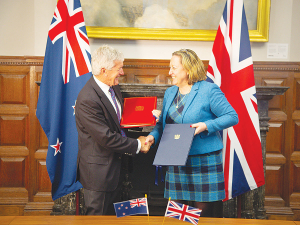Glut in global milk supply keeping prices down
The final Global Dairy Trade (GDT) auction has delivered bad news for dairy farmers.
 Trade and Export Growth Minister Damien O'Connor and UK Secretary of State for International Trade Anne-Marie Trevelyan signed an FTA last week that will result in close to full liberalisation of all trade.
Trade and Export Growth Minister Damien O'Connor and UK Secretary of State for International Trade Anne-Marie Trevelyan signed an FTA last week that will result in close to full liberalisation of all trade.
OPINION: Last week New Zealand dairy farmers woke up to fantastic news on two consecutive days.
The first was the early morning signing of a free trade deal between New Zealand and the United Kingdom in London.
The second was the Global Dairy Trade (GDT) price index rising for the fifth straight time; more importantly whole milk powder and skim milk powder, used by processors to set the milk price, posted solid gains.
The two doses of good news come as farmers grapple with issues including rising costs, a pandemic and a looming levy/tax on greenhouse gas emissions.
With the world the way it is right now, the trade deal and a strong forecast milk price give farmers reason to be reassured good things do still happen.
The FTA with the UK will result in close to full liberalisation of all trade. About 60% of NZ’s current dairy trade will enter the UK duty free at the start of the FTA, 99.5% within 5 years, and 100% within 7 years.
Tariffs will be eliminated over 5 years for butter (export value $1.6 million) and cheese (export value $500,000), with significant new duty-free quotas that will allow trade to grow during the transition period, until all tariffs and quotas are eliminated.
Many other dairy products will also become tariff free at entry into force, with the remainder eliminated over 3 or 7 years. This opens a significant dairy market that New Zealand exporters have long been effectively locked out of due to high tariffs.
Farmers will be looking forward to the deal pumping more money through the farm gate. Right now a record milk price is on the cards for all NZ dairy farmers.
Dwindling milk production in NZ and around the world is pushing prices up; the fallout from the war in Ukraine is also causing jittery buyers to pay higher prices and stockpile dairy products.
However, the global sanctions against Russia, a major producer of oil and gas, are also pushing fuel prices up. Farmers are facing steep prices increases for fertiliser and other inputs. Interest rates are also rising.
Farmers are astute business people: through careful planning they will get through.
The good news is that milk prices are holding up well. Our new FTA with the UK lays the foundation for higher prices in the years ahead. And when dairy farmers do well, New Zealand does well.
Fonterra’s midpoint of $9.60/kgMS represents a cash injection of over $14 billion into NZ’s economy through milk price payments alone.
Greenlea Premier Meats managing director Anthony (Tony) Egan says receiving the officer of the New Zealand Order of Merit (ONZM) honour has been humbling.
Waikato dairy farmer Neil Bateup, made a companion of the New Zealand Order of Merit (CNZM) in the New Year 2026 Honours list, says he’s grateful for the award.
Another Australian state has given the green light to virtual fencing, opening another market for Kiwi company Halter.
Farmer interest continues to grow as a Massey University research project to determine the benefits or otherwise of the self-shedding Wiltshire sheep is underway. The project is five years in and has two more years to go. It was done mainly in the light of low wool prices and the cost of shearing. Peter Burke recently went along to the annual field day held Massey's Riverside farm in the Wairarapa.
Applications are now open for the 2026 NZI Rural Women Business Awards, set to be held at Parliament on 23 July.
Ravensdown has announced a collaboration with Kiwi icon, Footrot Flats in an effort to bring humour, heart, and connection to the forefront of the farming sector.